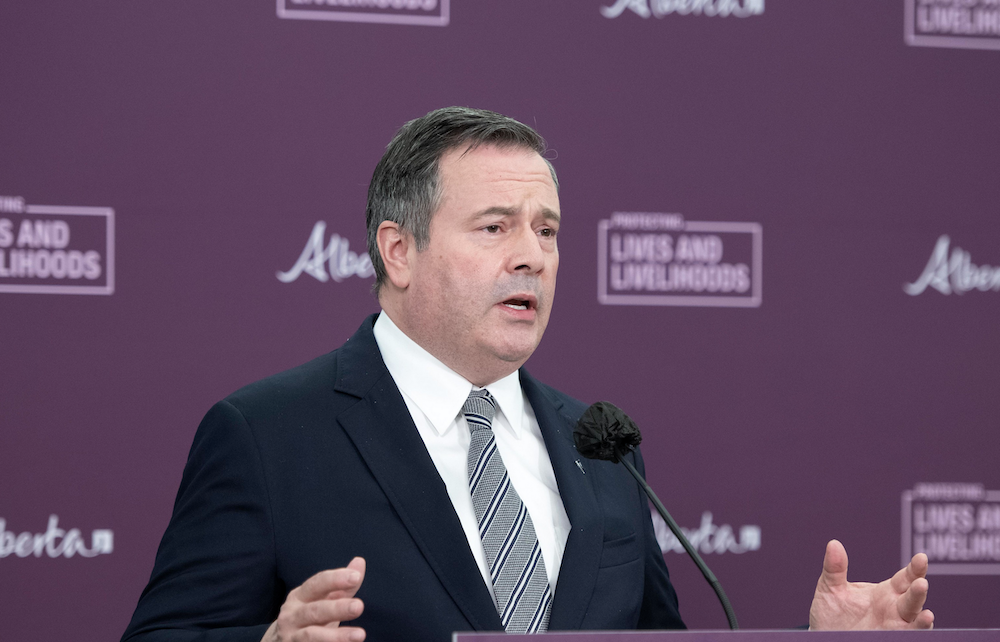Faced with rising infection rates and a frightening upswing in coronavirus variants, Alberta Premier Jason Kenney reluctantly announced a return to somewhat stricter measures to control the spread of COVID-19 in the province yesterday.
Half-hearted though the reimposed restrictions announced at yesterday afternoon’s COVID-19 news conference may seem to advocates of strict lockdowns and a COVID-zero policy, the measures represent a fairly dramatic flip-flop from a few days ago when the premier was all but declaring the pandemic over and nothing but sunshine and happy days ahead of us this summer.
But that, presumably, was before the government’s public health experts drew the attention of the awkwardly named COVID Cabinet Committee to the gravity of the spread of more infectious variants of the coronavirus that are now showing up in Western Canada with a vengeance while vaccines are slowly being administered.
The result was the usual awkward Kenney compromise — unlikely to be strict enough to be properly effective but too strict to satisfy the United Conservative Party’s pandemic-denying base, which gazes longingly at packed baseball stadiums in Texas and ignores the COVID carnage south of the Medicine Line.
The return to so-called Stage 1 restrictions — which include a restored ban on indoor service in restaurants and lower capacity limits for retail stores, but continues lax rules for religious services and the government’s determination to keep schools open — mostly took effect at midnight last night.
Along with another initiative, the Kenney government now appears to be conducting its response to COVID-19 on a wing and a prayer, not necessarily in that order.
On Monday, Culture, Multiculturalism and Status of Women Minister Leela Aheer sent emails to the congregations of a number of churches, mosques and synagogues asking them to consider today to be a “Multi-faith Day of Prayer and Reflection” amid “the difficulties the COVID-19 pandemic has presented.”
“Throughout the COVID-19 pandemic, it has been uplifting to see how faith-based organizations continue to play an essential role in maintaining social connection, supporting mental health, and building resiliency among their communities,” said Aheer in the e-epistle revealed by sharp-eyed Lethbridge independent journalist Kim Siever. “This is vital work, and we are grateful to you for doing it.”
Alas, some faith communities — like Pastor James Coates’s GraceLife Church in Parkland Country — seem to be doing a little too much to maintain social connection. So much, indeed, that they risk some social infection as well. Presumably, though, Kenney will continue his government’s policy of not trying very hard to enforce the regulations he has just reintroduced.
While Aheer didn’t quite ask for prayerful intercession, someone in the UCP strategic brain trust must have concluded it might not be a bad idea to enlist the assistance of the Almighty to help deal with the third wave of the pandemic, the government’s constant flip-flopping from inadequate circuit-breakers to hasty re-openings not having proved sufficient.
Aheer’s effort was not, oddly, accompanied by one of the Kenney government’s usual myriad press releases.
Missing from Kenney’s news conference yesterday was the habitual Ottawa-bashing, likely because supplies of vaccines are now flowing to the provinces faster than the provinces can get them into their citizens’ arms.
This prompted Prime Minister Justin Trudeau to volunteer yesterday to help the provinces speed up their vaccine rollouts. This is one federal offer Kenney is unlikely to take up, however, no matter what the cost of refusing to do so might be.
The premier was also unwilling to accept a reporter’s suggestion he was wrong a week ago when he argued the lax measures then in place were strong enough. The reporter asked: “Is this announcement an admission that you were wrong and that we should have brought in stronger measures?”
“No! I still believe that to be the case,” the premier insisted, explaining that it’s Albertans who won’t behave responsibly who are the source of the problem. He followed up with a rambling discourse on how “if everybody were to comply with the public health measures that were in place over the past few weeks, we wouldn’t be seeing the kind of huge exponential growth that we are right now,” while stating that “we’re never looking for 100-per-cent perfect compliance here.”
“We just hope people will make an effort, probably, to follow the guidelines,” he said.
Unfortunately, that’s unlikely, probably, to be enough.
Naheed Nenshi, ground-breaking Calgary mayor, prepares to bow out
Naheed Nenshi, Calgary’s popular and progressive mayor, will not seek re-election in October.
The first Muslim mayor of a major Canadian city, Nenshi announced yesterday that he will not seek a fourth term at the helm of Alberta’s largest city.
A foe of expensive and uncontrolled urban development on the city’s fringes and a friend of public transit, Nenshi was loathed by a deep-pocketed group of conservative developers known locally as “the sprawl cabal,” who have been planning an expensive campaign to replace him with a more sympathetic voice at city hall.
It will be interesting to see if, with a little help from Kenney’s UCP government, they can restore the development gravy train and derail the approved but still-unbuilt Green Line LRT.
Nenshi’s decision to depart, though, rather deprives them of the most obvious target for their effort.
It will also be interesting to see who steps up to try to fill Nenshi’s shoes.
A story by CBC Calgary reporter Drew Anderson yesterday gives a good sense of Nenshi’s successes, failures, and legacy.
While he may be finished with Calgary city hall, it wouldn’t be a surprise to learn Nenshi isn’t quite done with politics.
David Climenhaga, author of the Alberta Diary blog, is a journalist, author, journalism teacher, poet and trade union communicator who has worked in senior writing and editing positions at The Globe and Mail and the Calgary Herald.
Image credit: Chris Schwarz, Government of Alberta/Flickr



